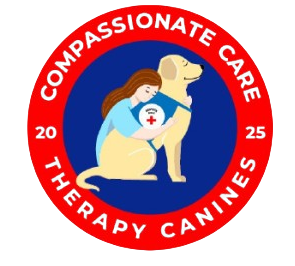

How Therapy and Emotional Support Therapy Canines Help?
Compassionate care and emotional support according to research provided by therapy canines play a vital role in enhancing the well-being of individuals facing various challenges. These gentle and loving animals offer comfort and companionship, helping to alleviate feelings of loneliness and anxiety. Their presence can create a soothing environment, fostering emotional healing and resilience. Through their intuitive nature, therapy dogs connect with people on a profound level, providing not just support but also a sense of unconditional love that can significantly improve mental health outcomes.
A Wide Range of Health Benefits
Therapy dogs can provide valuable support to individuals across various age groups and with a multitude of conditions. Their gentle presence and affectionate nature can help improve emotional well-being, reduce anxiety, and foster a sense of companionship, making a positive impact on the lives of many.
Mental Health
As awareness of the connection between pets and mental health has increased, animal-assisted therapy programs have become vital components of mental health care. Engaging with therapy dogs has been shown to reduce cortisol levels, the hormone associated with stress, while simultaneously boosting the release of oxytocin, a natural stress-reliever.
This highlights the profound impact of animal-assisted therapy. Additionally, spending time with a therapy dog can lower blood pressure through its calming sensory effects. Research indicates that dogs can effectively soothe hyperactive or aggressive children, further demonstrating their therapeutic potential.
Physical Health
Engaging with therapy dogs can significantly motivate patients to persist with their therapy, enhance their emotional well-being, and alleviate pain. These gentle companions may also aid individuals in maintaining proper movement and encourage regular physical activity, which is beneficial for various health conditions. Additionally, specific types of therapy dogs can provide targeted support for different physical ailments, fostering a more holistic approach to healing"
Epilepsy
Diabetes
Cardiovascular disease
Post-surgical recovery
Motor skills development
Cancer-related pain and discomfort
Post-stroke recovery
How Therapy Dogs Impact Emotional Health
Therapy dogs can significantly improve emotional health by reducing stress, anxiety, and depression, while also fostering feelings of comfort, safety, and connection. Their presence can enhance mood, boost motivation, and even improve focus and concentration.
Reduced Stress and Anxiety:
Interacting with therapy dogs, like petting them, can lower cortisol (stress hormone) levels and increase the production of serotonin and dopamine, which promote feelings of happiness and tranquility.
Improved Mood and Reduced Depression:
The unconditional love and affection of therapy dogs can help alleviate feelings of isolation, loneliness, and sadness, thus combating depression.
Enhanced Self-Esteem and Motivation:
The positive interactions with therapy dogs can boost self-esteem and provide a sense of purpose, encouraging individuals to engage more actively in their lives and therapy sessions.
Increased Socialization:
Therapy dogs can facilitate social interaction and create a sense of community, especially in settings like schools or hospitals, by encouraging conversations and connections between people.
Improved Focus and Concentration:
The calming presence of therapy dogs can help individuals relax and focus, leading to improved concentration and academic performance in students.
Who Benefits from Therapy Dogs?
Therapy dogs can be beneficial for a wide range of individuals, including:
People with mental health conditions like depression, anxiety, PTSD, and schizophrenia.
Students in educational settings, particularly those experiencing stress or anxiety.
Patients in hospitals or long-term care facilities.
Individuals recovering from trauma or undergoing therapy.
Elderly individuals experiencing loneliness or isolation.
Healthcare workers experiencing emotional exhaustion.
Important Considerations:
Allergies and Fear:
It's crucial to consider potential allergies or fears individuals may have towards dogs.
Individual Preferences:
Some individuals may not find comfort in the presence of animals, and it's important to respect their preferences.
Professional Guidance:
Therapy dogs should always be part of a broader therapeutic approach, guided by qualified professionals.
A Guide to Implementing a Complementary Approach
Therapy dogs can play a valuable role in enhancing other forms of treatment, but they should not be viewed as a primary method for addressing any medical condition. Their presence can complement the benefits of established therapies, such as physical, occupational, and psychotherapy, but they cannot replace the essential contributions these therapies provide.
The Heartwarming Role of Therapy Dogs
Dopamine, a vital chemical associated with pleasure, is released in the brain when individuals interact with therapy dogs. However, responses to this form of therapy can vary based on individual circumstances and conditions. Compassionate Care Therapy Canines is committed to certifying therapy-dog teams, enabling them to foster this healing bond between humans and animals across the globe. Our dedicated team works tirelessly every day to spread positivity and offer support when it’s most needed. Reach out to us today!
Compassionate care and emotional support provided by therapy canines play a vital role in enhancing the well-being of individuals facing various challenges. These gentle and loving animals offer comfort and companionship, helping to alleviate feelings of loneliness and anxiety. Their presence can create a soothing environment, fostering emotional healing and resilience. Through their intuitive nature, therapy dogs connect with people on a profound level, providing not just support but also a sense of unconditional love that can significantly improve mental health outcomes.
A Wide Range of Health Benefits
Therapy dogs can provide valuable support to individuals across various age groups and with a multitude of conditions. Their gentle presence and affectionate nature can help improve emotional well-being, reduce anxiety, and foster a sense of companionship, making a positive impact on the lives of many.
Mental Health
As awareness of the connection between pets and mental health has increased, animal-assisted therapy programs have become vital components of mental health care. Engaging with therapy dogs has been shown to reduce cortisol levels, the hormone associated with stress, while simultaneously boosting the release of oxytocin, a natural stress-reliever.
This highlights the profound impact of animal-assisted therapy. Additionally, spending time with a therapy dog can lower blood pressure through its calming sensory effects. Research indicates that dogs can effectively soothe hyperactive or aggressive children, further demonstrating their therapeutic potential.
How Therapy Dogs Impact Emotional Health
Therapy dogs can significantly improve emotional health by reducing stress, anxiety, and depression, while also fostering feelings of comfort, safety, and connection. Their presence can enhance mood, boost motivation, and even improve focus and concentration.
Reduced Stress and Anxiety:
Interacting with therapy dogs, like petting them, can lower cortisol (stress hormone) levels and increase the production of serotonin and dopamine, which promote feelings of happiness and tranquility.
Improved Mood and Reduced Depression:
The unconditional love and affection of therapy dogs can help alleviate feelings of isolation, loneliness, and sadness, thus combating depression.
Enhanced Self-Esteem and Motivation:
The positive interactions with therapy dogs can boost self-esteem and provide a sense of purpose, encouraging individuals to engage more actively in their lives and therapy sessions.
Increased Socialization:
Therapy dogs can facilitate social interaction and create a sense of community, especially in settings like schools or hospitals, by encouraging conversations and connections between people.
Improved Focus and Concentration:
The calming presence of therapy dogs can help individuals relax and focus, leading to improved concentration and academic performance in students.
Compassionate Care Therapy Canines, Inc
A 501(3)(c) non-profit: EIN: 33-4426479
Phone: 707.497.7166
Email: therapycanines@yahoo.com
Mail: CCTC
POB 27
Trinidad, CA 95570
© 2025 by Compassionate Care Therapy Canines, Inc. All rights reserved.


They Train. They Serve. They Heal.
At Compassionate Care Therapy Canines, Inc, our trained volunteers and certified therapy dogs are devoted to healing lives in our communities with programs designed to meet the unique needs of each person we serve using the mutually nurturing relationship between people and dogs.
